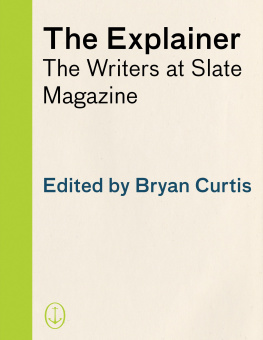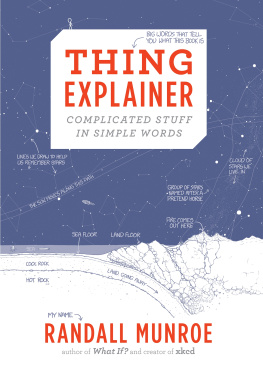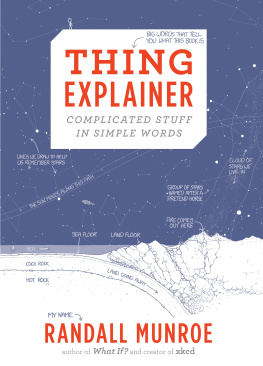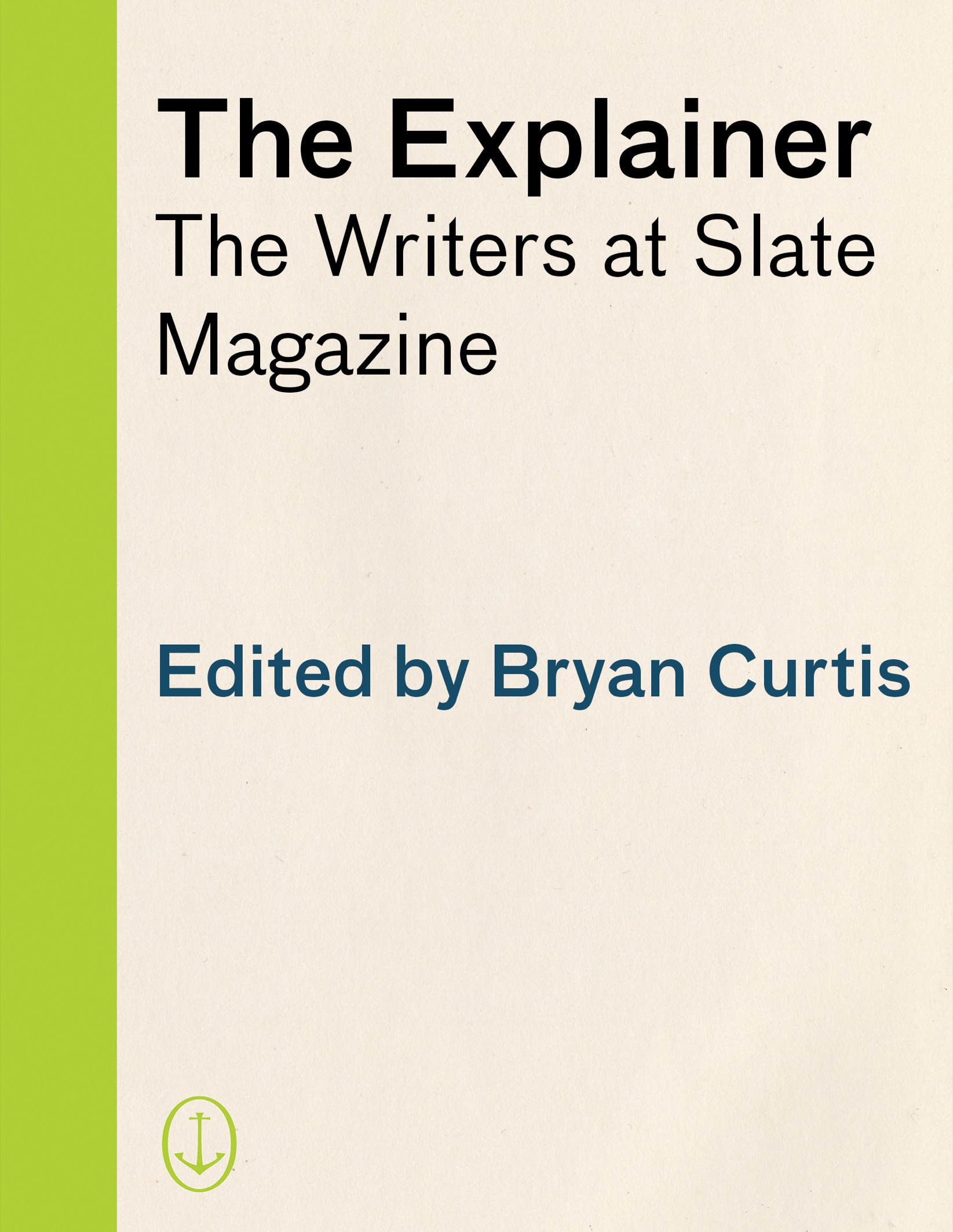INTRODUCTION: WHAT IS AN EXPLAINER?
The White House correspondent of The New Republic in the 1960s and 1970s was an old shoe-leather reporter named John Osborne. A courtly, crusty, southern chain-smoker, he was very much self-styled and quite set in his ways. One of his ways was dictating his stories by telephone if he had the slightest reason to be away from the office. Part of my job in the august role of editor of The New Republic was to work the typewriter on the receiving end. John rigorously followed some ancient, real or imagined wire-service ritual of spelling out certain words. President Carters national security advisor, Zbigniew Brzezinski, he would intone, adding helpfully, Thats a-d-v-i-s-o-r.
In that spirit, we offer this collection from Slates popular Explainer column. The idea is this: Youre reading the morning paper or listening to the TV news and a question arises in your mind. Despite the best efforts of top journalists, theres something you dont get. Every workday morning, Slates editors and writers exchange their I dont get its by e-mail. Whoever is writing that days Explainer column then goes off to find the explanation and post it for readers by the afternoon.
As with Slates other attempts at what we pretentiously call intelligent synthesis, we try to produce Explainers that our readers can use in two different ways. They can treat the column as an introduction and framework for learning more about the subject. Internet hyperlinks are invaluable for this. Or they can use it as an executive briefing, a way to avoid learning any more about the subject. Our goal is to give you exactly enough understanding to bluff your way through the next business meeting or dinner partybut not one bit more than necessary.
Slates Explainers come in several varieties, correlating with the different ways other media fall down on the explanatory job. (Nothing in Slate itself, of course, ever requires further explanation.) Sometimes the dynamics of how a story got into the papers and where its information came from are an important part of the story itself, but dainty journalistic conventions prevent your newspaper from making any of this clear. The New York Times might find half a dozen occasions on a typical day to inform its readers that the secretary of state is named Colin Powell. But the Times will not tell us whether that senior American official they are quoting is also named Powell, and why he is saying such terrible things, off the record, about some other senior official. A daily Explainer might tear off the veil and describe whats really going on. Or it might discard the innards of the news story and explain the journalistic rules about unnamed sources.
Often, especially on TV, there just isnt room for enough background informationeven for the dinner-party minimaliston why two countries are at war or where some singer fits in the pantheon of rock music, or how double-entry bookkeeping differs from keeping two sets of books. Sometimes the problem isnt space but the understandably skewed perceptions of a writer who has been covering NATO for so long that hes forgotten that everyone else has forgotten why or even whether France is a member.
And sometimes theres a question on the minds of 99 percent of those who are following the news on a particular day, but which the other media are too dignified to answer. But very little is beneath the dignity of Slate, if sacrificing our dignity will sate the legitimateor at least understandablecuriosity of our readers. Who are all these people in the news with the same last name, or even first name? Does that presidential proclamation about the need for more tax cuts rhyme on purpose?
The American educated class is plagued by a snobbery you might call knowingness. We dont like to admit, even to ourselves, that we often dont know what the hell others among us are talking about. Print magazines that deal with politics, policy, and culture both high and low often pander to the vanity of knowingness by assuming that their readers already know all about the place of Berlioz in the hierarchy of Romantic music, the philosophical difference between the Constitution and the Articles of Confederation, the names of the last five editors of Vogue and why they were fired, who Wendell Willkie was, what the genome is and why it is called that, and so on. As enablers, these publications make the symptoms worse in two ways. First, they flatter their readers with the assumption that theyre this knowledgeable. Second, they terrify those same readers by making them worry that everybody else actually does know all this stuff.
From the beginning at Slate we have tried to avoid the snobbery of knowingness. We assume that our readers are intelligent and intellectually curious. But we also assume that no one can simultaneously be an expert, or even a well-informed layperson, in all the different areas we write about. (Certainly the founding editor was not, and he was very careful to hire staff memberssome of whom are now running the jointwho would not be likely to hurt his feelings with their wide expertise either.) We try to supply context and explanation in everything we publish, but Explainer is where we supply it straight and pure. Id like to say we do this because our readers are more into intellectual honesty than into petty snobbery about what they may not know. Some of them are, no doubt. For the rest, we help you bluff.
Explainer, by the way, is an old newspaper term forwell, for an article that supplies explanation or exegesis. Thats s-u-p-p-1-i-e-s.
Michael Kinsley
CAN YOU BREAK EVEN PLAYING SLOTS?
Conservative moralist William Bennett claimed hed come out pretty close to even gambling over the fast decade, contradicting a report that pegs his losses at around $8 million. Given Bennetts stated preference for high-stakes slot machines and video poker, does his claim hold mathematical water?
As a few lucky Powerball winners can attest, nothings impossible when it comes to fighting astronomical odds. But its highly improbable that Bennett has broken even through the years. The primary factor working against the former White House drug czar is his choice of games. Professional gamblers and mathematicians alike eschew slot machines as suckers bets; since no skill is involved, theyre fixed to favor the house, and the rapid action translates into rapid losses. The notion of any machine being hot or cold on a given evening is pure myth, since theyre powered by computer chips that function as random number generators. The belief among slot pullers that past losses mean soon-to-be-realized jackpotsthe Im due mentalityis referred to as the gamblers fallacy. One bet has absolutely nothing to do with the next.
Slots are fixed to pay out a certain percentage of the money wagered in each machine. In Atlantic City, for example, where Bennett has done much of his gambling, state law sets a minimum payout of 83 percent. However, because of market competitioneveryone wants the Loosest Slots in Town! titlethe actual average is much higher, usually estimated in the range of 90 to 95 percent. (Predictably, casinos are rather cagey about their gaming statistics.) The remaining 5 to 10 percent is referred to as the casinos hold, or take. The high-stakes machines, which Bennett favors, have higher payout percentages, sometimes hitting 98 percent.













